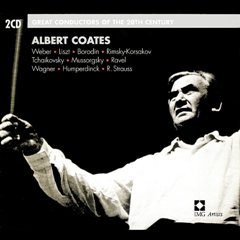Great Conductors Of The 20th Century Vol.17 - Albert Coates
Great Conductors Of The 20th Century Vol.17 - Albert Coates

CD1 1. Oberon: Overture 2. Mephisto Waltz No.1, S110 No.2 3. Symphony No.2 in B Minor: I. Allegro - Animato Assai 4. Symphony No.2 in B Minor: II. Scherzo. Prestissimo - Allegretto 5. Symphony No.2 in B Minor: III. Andante 6. Symphony No.2 in B Minor: IV. Finale. Allegro 7. Mlada: Procession Of The Nobles 8. Francesca Da Rimini, Op.32 9. Sorochintsy Fair: Gopak 10. La Valse CD2 1. Tannhauser: Overture 2. Das Rheingold: Einzug Der Gotter 3. Die Walkure: Feuerzauber 4. Gotterdammerung: Siegfrieds Rheinfahrt 5. Tristan Und Isolde: Love Duet From Act II 6. Hansel Und Gretel: Prelude 7. Tod Und Verklarung, Op.24 London Symphony Orchestra Albert Coates – conductor
Albert Coates is best known as a wild, even fierce interpreter of Wagner and of Russian music. Born in St. Petersburg in 1882 of English parents, he was educated in England, studied composition with Rimsky-Korsakov, was a protégé of conductor Arthur Nikisch, conducted opera in Russia, Germany, and England, and after the Russian Revolution was made director of all opera houses in the Soviet Union. Phew! There’s enough there for an epic novel, and that doesn’t even get to his escape from Russia to Finland in 1919, his long association with the London Symphony, or his stint in America. Coates was a prolific recording artist in the 1920s and early ’30s, and his entry in EMI’s Great Conductors series presents a representative sample of his studio work between 1926 and 1930. Coates was something of a speed demon, a high-voltage conductor who prized excitement and wide contrasts. It can become overbearing at times, but when his style meets congenial material, sparks fly. One such meeting of man and music is Borodin’s Second Symphony, with a powerful, strongly accented first movement that places a premium on orchestral brilliance and color, a windswept Scherzo, a brooding Andante full of bardic Russian poetry, and a folk dance-based Finale. There’s a sense of abandon and controlled wildness to this performance, along with tempos that make other versions sound sedate. Try this one on your friends and see if they can guess that it’s conducted by an Albert, not a Yevgeni.
In Rimsky-Korsakov’s Procession of the Nobles from Mlada, Coates’ nobles march in quickstep to exhilarating brass fanfares. Tchaikovsky’s Francesca da Rimini, with cuts, opens with a whirlpool of sound and downright violent rushing scales. But Coates also infuses the andante cantabile section with an enveloping warmth that overcomes some sour wind playing. In the Gopak from Mussorgsky’s Sorochintsky Fair, Coates is so into the music’s folkish primitivism that you can almost see peasants roiling through muddy village streets swigging vodka and cracking whips.
The Wagner works, comprising most of the second disc, are equally exciting–sort of unbuttoned Solti in vintage sound. But they’re even faster and more forceful, as in the string figures near the start of the Tannhäuser Overture, and so insistent they threaten to overwhelm the brass. Siegfried’s Rhine Journey sounds like the hero’s escorted by battleships, with some whitewater thrills thrown in for good measure. The core of the Wagner set is the often reissued, feverish Act 2 Love Duet from Tristan und Isolde with the greatest Wagnerian singers of the day, Frida Leider and Lauritz Melchior.
These generously packed discs also include major Ravel (La Valse, notable for the strange subterranean sounds at the start and the riotous close) and a Strauss Death and Transfiguration that offers few idiosyncrasies. There’s also a Weber Oberon Overture notable for a brutal attack into the fast section that follows a well-rendered poetic introduction, and a straightforward Liszt Mephisto Waltz No. 1.
Coates isn’t a conductor for everyone, but if you’re a historical recordings buff, this one’s for you. Obviously, many of these performances are seriously compromised by aged sonics, but Ward Marston’s tape remastering and Paul Baily’s transfers wring more from the originals than seems possible. Still, Wagner, Strauss, et al., fare best in wide-ranging stereo, as would Coates, whose (seemingly) vast dynamic range and predilection for extremes would have benefited mightily from modern sound. --- Dan Davis, classicstoday.com
download:








